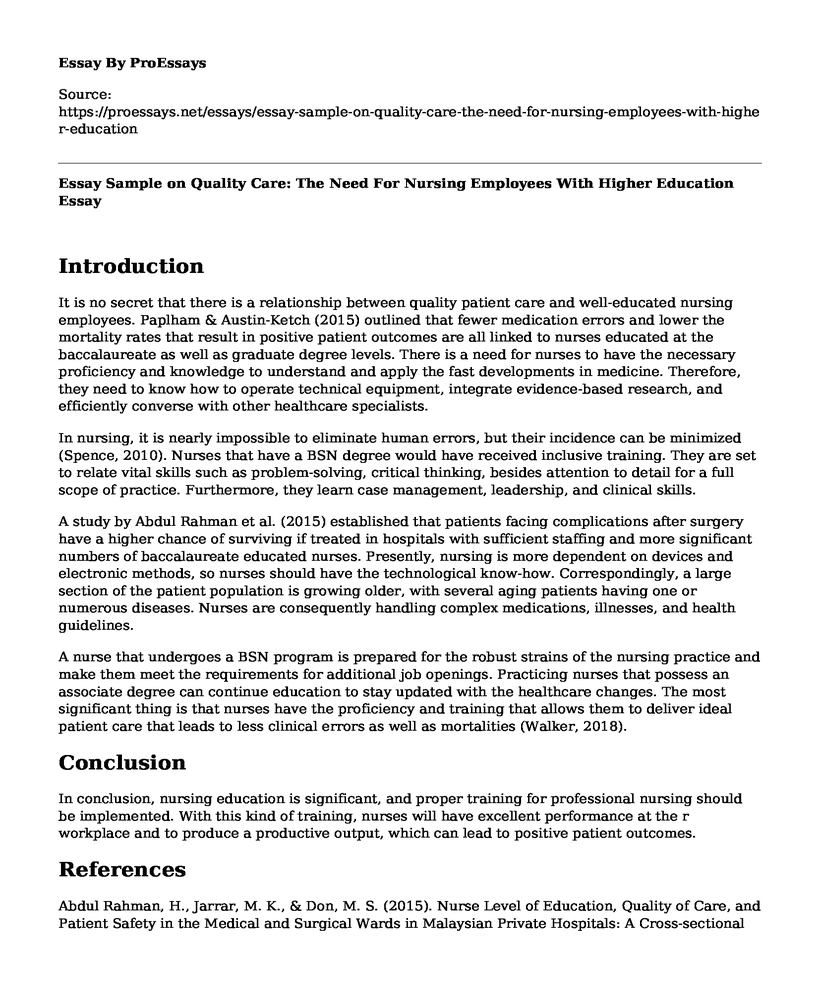Introduction
It is no secret that there is a relationship between quality patient care and well-educated nursing employees. Paplham & Austin-Ketch (2015) outlined that fewer medication errors and lower the mortality rates that result in positive patient outcomes are all linked to nurses educated at the baccalaureate as well as graduate degree levels. There is a need for nurses to have the necessary proficiency and knowledge to understand and apply the fast developments in medicine. Therefore, they need to know how to operate technical equipment, integrate evidence-based research, and efficiently converse with other healthcare specialists.
In nursing, it is nearly impossible to eliminate human errors, but their incidence can be minimized (Spence, 2010). Nurses that have a BSN degree would have received inclusive training. They are set to relate vital skills such as problem-solving, critical thinking, besides attention to detail for a full scope of practice. Furthermore, they learn case management, leadership, and clinical skills.
A study by Abdul Rahman et al. (2015) established that patients facing complications after surgery have a higher chance of surviving if treated in hospitals with sufficient staffing and more significant numbers of baccalaureate educated nurses. Presently, nursing is more dependent on devices and electronic methods, so nurses should have the technological know-how. Correspondingly, a large section of the patient population is growing older, with several aging patients having one or numerous diseases. Nurses are consequently handling complex medications, illnesses, and health guidelines.
A nurse that undergoes a BSN program is prepared for the robust strains of the nursing practice and make them meet the requirements for additional job openings. Practicing nurses that possess an associate degree can continue education to stay updated with the healthcare changes. The most significant thing is that nurses have the proficiency and training that allows them to deliver ideal patient care that leads to less clinical errors as well as mortalities (Walker, 2018).
Conclusion
In conclusion, nursing education is significant, and proper training for professional nursing should be implemented. With this kind of training, nurses will have excellent performance at the r workplace and to produce a productive output, which can lead to positive patient outcomes.
References
Abdul Rahman, H., Jarrar, M. K., & Don, M. S. (2015). Nurse Level of Education, Quality of Care, and Patient Safety in the Medical and Surgical Wards in Malaysian Private Hospitals: A Cross-sectional Study. Global Journal of Health Science, 7(6). https://doi.org/10.5539/gjhs.v7n6p331
Paplham, P., & Austin-Ketch, T. (2015). Doctor of Nursing Practice Education: Impact on Advanced Nursing Practice. Seminars in Oncology Nursing, 31(4), 273-281. https://doi.org/10.1016/j.soncn.2015.08.003
Spence Laschinger, H. K. (2010). Positive Working Relationships Matter for Better Nurse and Patient Outcomes. Journal of Nursing Management, 18(8), 875-877. https://doi.org/10.1111/j.1365-2834.2010.01206.
Walker, S. (2018). Positive Patient Outcomes: More than a Degree. Teaching and Learning in Nursing, 13(4), A13-A15. https://doi.org/10.1016/j.teln.2018.06.001
Cite this page
Essay Sample on Quality Care: The Need For Nursing Employees With Higher Education. (2023, Apr 10). Retrieved from https://proessays.net/essays/essay-sample-on-quality-care-the-need-for-nursing-employees-with-higher-education
If you are the original author of this essay and no longer wish to have it published on the ProEssays website, please click below to request its removal:
- Stakeholders in Healthcare
- Course Work Example: Evidence-Based Research in Nursing
- Predicting Homelessness Among Emerging Adults Aging Out of Foster Care Essay
- Paper Example on Fall Prevention in Older Adults: Assessing the Economic Burden
- Hospitals Reduce Cost of Care Through Improved Discharge Periods - Research Paper
- Essay Example on Climate Change: Impact on Human Behaviour and Long-Term Health
- Free Report Example on Prisoners as Test Subjects: Pros & Cons of Holmesburg Case







